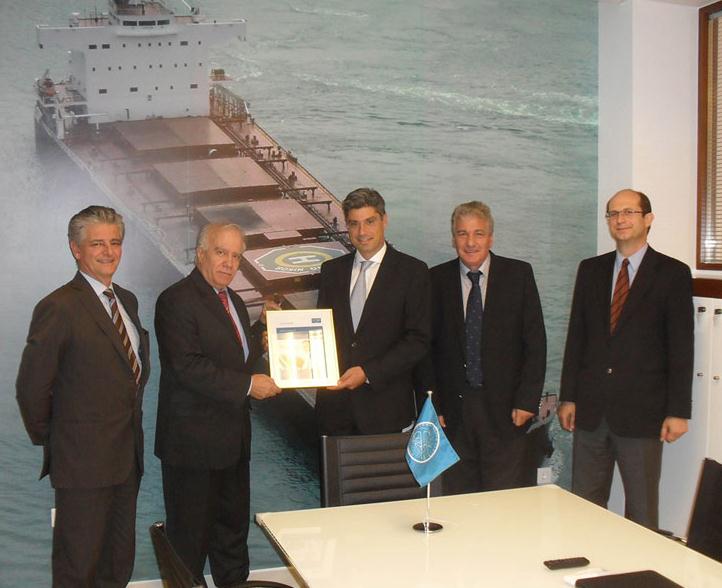Greece: EFNAV Receives Certificate for the 1,000st SEEMP

Getting ready to comply with the incoming requirement to implement a Ship Energy Efficiency Management Plan (SEEMP) is at the top of the agenda of ship owners and operators.
To help them to meet the challenge of improving vessel fuel efficiency to meet this incoming regulation, while increasing cost competitiveness, FutureShip GmbH, the maritime consulting arm of classification society Germanischer Lloyd (GL), has developed the SEEMP Solution. Recently in Athens the company presented EFNAV COMPANY LTD (EFNAV) with a certificate for the 1,000st SEEMP.
“Excellent service and the shortest lead-time were, alongside a competitive price, the main reasons to go with FutureShip as our partner for implementation of a SEEMP. We ensure that we will have zero hassle with Port State Control after implementation, while at same time my team in supported in making energy saving part of their daily routines,” said EFNAV’s Technical Manager, Mr Pantelis Chondros, of the decision to implement a SEEMP with FutureShip.
The FutureShip SEEMP Solution is designed as a template based form that allows the Energy Manager of a shipping company to select measures appropriate to their business and convert these into vessel specific SEEMPs. Every single SEEMP is checked by FutureShip personnel to minimize the chance of error. The SEEMP Solution comes with a vessel specific EEOI calculator for every vessel of a fleet.
The SEEMP was adopted by the IMO in an effort to spur innovation and reduce CO2 emissions and is now a part of MARPOL Annex VI. The SEEMP is mandatory for all sea going ships (both new and existing ships) larger than 400 GT from 1 January 2013.
Envisioned as a management tool to assist a company in improving energy efficiency of ships in operation, a SEEMP must be specific for each ship in a fleet and should be used together with established environmental management systems. A SEEMP allows companies to reduce fuel consumption through simple operational measures and making investments that can improve performance and pay off in reduced costs.
The SEEMP as a cyclic process with 4 steps in each cycle: Planning, Implementation, Monitoring, Self-Evaluation & Improvement. Selected measures with goals to be achieved are at the core of a SEEMP, this enables continuous improvement through lessons learned. The measures could involve different aspects of ship operation: fuel efficient operations, improved voyage planning, optimise ship handling, fleet management, and cargo handling.
“More than just a paper tiger, as well as allowing owners and operators to maximise the efficiency of their fuel saving measures, the SEEMP has the potential to enhance the deployment of data sharing and the modern software tools that go along with the sophisticated analysis of ship performance. Vessels with a SEEMP in place has already shown to make marked improvements in fuel consumption and as the processes and systems become more familiar to the shipping industry this will certainly grow,” said Till F. Braun, Managing Consultant with FutureShip GmbH.
The FutureShip SEEMP Solution is currently available in Russian, English and Spanish language to complement requirements that SEEMP should be established in a working language or languages understood by ship’s personnel. Other Languages are available upon request.
FutureShip has already demonstrated that implementing a SEEMP can have extremely beneficial results when a comprehensive system of continuous improvement is introduced. On demand, energy efficiency management consulting support up to any required level is offered by FutureShip and many customers have already taken advantage of this service to work with FutureShip to develop individually tailored energy saving measures.
The consulting scheme is complemented by FutureShip’s ECO-Assistant, a sophisticated CFD (computational Fluid Dynamics) trim optimization tool. This tool, which can be used either stand-alone or directly connected to a vessel’s loading computers, can bring reductions in fuel consumption of 5% on average. Recently awarded the Lloyds List Asia Environmental Award, it is in use with many operators, especially in the BulkCarrier, MPV, Container Ship, GasCarrier and PCC sectors.
HEADLINES
- Do shipping markets want Biden or Trump for the win?
- All 18 crew safe after fire on Japanese-owned tanker off Singapore
- Singapore launching $44m co-investment initiative for maritime tech start-ups
- Cosco debuts Global Shipping Industry Chain Cooperation Initiative
- US warns of more shipping sanctions
- China continues seaport consolidation as Dalian offer goes unconditional